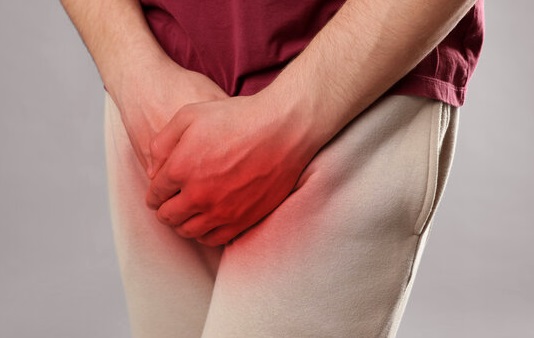SARS-CoV-2 Hijacks Testicular Cells to Fuel Its Replication and Worsens Male Hormone Imbalance
Nikhil Prasad Fact checked by:Thailand Medical News Team Jun 03, 2025 8 months, 3 weeks, 1 day, 1 hour, 34 minutes ago
Medical News: A new study from Brazilian and American scientists reveals that the SARS-CoV-2 virus not only invades the lungs and other organs but also deeply affects male reproductive organs, especially the Leydig cells in the testes. These are the cells responsible for producing testosterone — the primary male hormone — and their dysfunction could explain the sharp drop in testosterone levels seen in many men with COVID-19.
 SARS-CoV-2 Hijacks Testicular Cells to Fuel Its Replication and Worsens Male Hormone Imbalance
SARS-CoV-2 Hijacks Testicular Cells to Fuel Its Replication and Worsens Male Hormone Imbalance
This alarming discovery was made through research involving transgenic mice specially engineered to express human ACE2 receptors (K18-hACE2 mice), which the virus uses to enter cells. The study was a collaboration among researchers from the Federal University of São Paulo, São Paulo State University (UNESP), University of Virginia, and the Faculty of Medicine of Ribeirão Preto at the University of São Paulo. This
Medical News report explores the depth of these findings and their potential implications for men's health, both during and after COVID-19 infection.
Virus Directly Infects Testosterone-Producing Leydig Cells
Using sophisticated laboratory techniques including immunofluorescence, Western blotting, and electron microscopy, the researchers confirmed that SARS-CoV-2 infects the Leydig cells. These cells, located between the seminiferous tubules of the testes, were found to have high levels of the ACE2 receptor — the very "door" the virus uses to enter human cells.
Once inside the Leydig cells, the virus sets up camp, taking over the cellular machinery to reproduce itself. This was evidenced by the presence of viral spike and nucleocapsid proteins, and even fully formed viral particles within the cells. The researchers found viral components embedded in the lipid droplets and other internal structures critical to testosterone production.
Testosterone Production Disrupted While Lipid Levels Rise
The invasion of the Leydig cells had devastating effects on their ability to function. Infected cells showed reduced levels of steroidogenic factor-1 (SF-1), StAR protein, and 17β-HSD — all essential elements for testosterone synthesis. Testosterone itself was significantly reduced in the testicular tissue of the infected mice.
At the same time, the virus appeared to manipulate the cells' lipid metabolism. Genes such as SREBP-1, DGAT-1, and SCARB1, which are involved in fat synthesis and cholesterol uptake, were significantly upregulated. Lipid droplets, which normally help supply the cholesterol needed for hormone production, were hijacked to support viral replication. The Leydig cells became bloated with lipids, many of which were found to contain virus-like particles.
Immune Response in the Testes Adds to the Damage
Infected mice showed increased levels of inflammation in the testes. The number of immune cells, esp
ecially CD68+ and CD163+ macrophages, was significantly higher. Pro-inflammatory cytokines such as TNF-α, IL-6, and IL-1β were all found in greater amounts, and these are known to suppress hormone production.
Interestingly, while anti-inflammatory IL-10 was also elevated, it did not offset the overall inflammation. This suggests that the body’s effort to balance the immune response was not enough to prevent tissue damage.
Moreover, electron microscopy revealed Leydig cells with signs of distress: smaller nuclei, damaged membranes, and abnormal mitochondrial structures. These changes were consistent with the breakdown of normal steroid hormone production and cellular degeneration.
A Vicious Cycle of Damage
The researchers observed that SARS-CoV-2 not only uses the Leydig cells for replication but also damages them in the process, impairing their ability to produce testosterone. Low testosterone has already been associated with more severe COVID-19 outcomes in men. This study provides a biological explanation for this pattern: the virus may be causing or exacerbating hormonal imbalances that weaken the immune response, thus creating a vicious cycle.
Long-Term Implications for Male Reproductive Health
While this study was conducted in mice, the implications for human males are serious. Previous research on human autopsy samples has shown similar patterns of testicular infection and damage. If SARS-CoV-2 can persist in the testes, it might contribute to long-term hormonal and fertility issues in some men, even after they recover from COVID-19.
The researchers urge that more studies be done to explore these effects in human subjects and to determine whether antiviral or hormone-based therapies might help protect or restore testicular function in affected individuals.
Conclusion
This groundbreaking study demonstrates that SARS-CoV-2 is capable of infecting Leydig cells in the testes, disrupting testosterone production, and hijacking lipid metabolism to support its replication. The virus not only impairs these hormone-producing cells but also triggers an inflammatory response that further damages the testicular environment. These findings help explain the reduced testosterone levels observed in many male COVID-19 patients and may have long-term implications for male reproductive health. Understanding the virus’s impact on the testicles is crucial for managing both acute and chronic effects of the disease, especially in men of reproductive age.
The study findings were published in the peer reviewed journal: Frontiers in Cellular and Infection Microbiology.
https://www.frontiersin.org/journals/cellular-and-infection-microbiology/articles/10.3
For the latest COVID-19 News, keep on logging to Thailand
Medical News.
Read Also:
https://www.thailandmedical.news/news/sars-cov-2-hijacks-steroidogenesis-and-lipid-metabolism-in-male-reproductive-cells-to-fuel-its-replication
https://www.thailandmedical.news/news/covid-19-causes-testicular-inflammation-leading-to-testicular-tissue-damage-and-decreased-fertility
https://www.thailandmedical.news/news/texas-study-finds-that-sars-cov-2-literally-damages-the-testes-and-testicular-tissues-in-a-variety-of-way-and-also-the-blood-testes-barrier
https://www.thailandmedical.news/news/breaking-brazilian-and-american-study-discovers-that-the-testes-of-males-could-be-viral-sanctuaries-for-the-sars-cov-2-virus
https://www.thailandmedical.news/articles/coronavirus
https://www.thailandmedical.news/pages/thailand_doctors_listings
